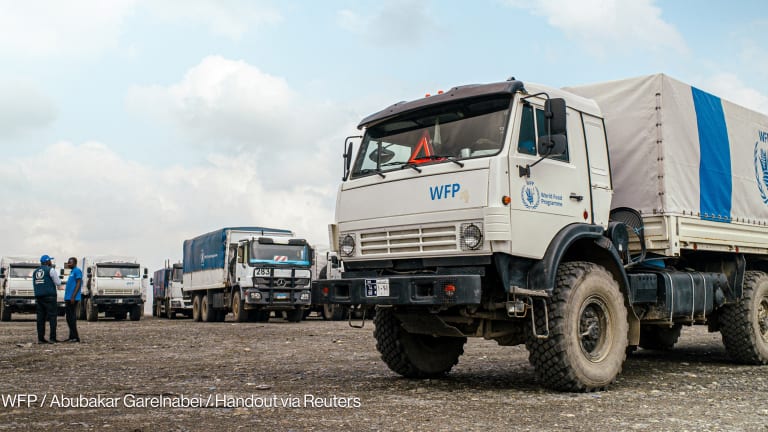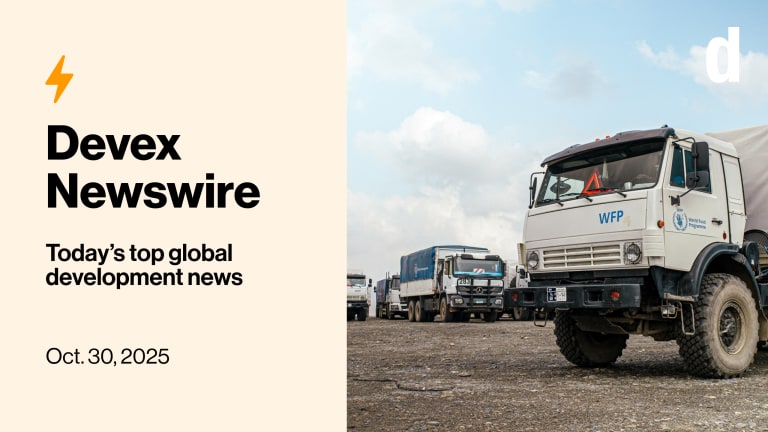
NEW YORK — The World Food Programme is in a “race against time” to reach vulnerable communities in South Sudan before expected heavy rains place them out of reach for much of the year, according to Matthew Hollingworth, South Sudan country director at WFP.
With climate change making extreme weather patterns more common and pronounced, rains and flooding reached new levels in South Sudan last year, Hollingworth told Devex in a recent interview. For the WFP, that means the anticipated needs of food-insecure people have outpaced previous estimates — and available WFP funding.
“The international community needs to ensure that we don't take our focus off South Sudan.”
— Matthew Hollingworth, South Sudan country director, WFP“We always anticipate heavy rains, and we always anticipate areas being cut off because of flooding in the country,” Hollingworth said. “But this past year's rainy season was incredibly abnormal because it was, A, so heavy, and, B, it went for so long.”
More on South Sudan:
► South Sudan government strategizes to stave off potential famine
► Aid groups navigate uncertainty ahead of South Sudan unity government deadline
He added that “in parts of the country where normally you would expect rains, you'd never see rains this heavy, and in other parts of the country where you don't normally see any kind of flooding, we saw unprecedented levels.”
About 5.5 million South Sudanese are projected to go hungry in early 2020, U.N. and government food security data showed in December. The WFP increased its assistance to reach 4.6 million South Sudanese in 2019 and now requires $270 million for the first six months of 2020 amid projected increases in food insecurity — $100 million of which is needed “today,” Hollingworth said.
Millions of other people in Zimbabwe, Congo, and the Central Sahel region are among the other areas most at risk of heightened food insecurity in the first months of 2020, according to the “WFP Global Hotspots 2020” report.
“If we don’t meet our pre-positioning goals, then we need to make really difficult decisions about which communities we prioritize,” Hollingworth said. “And that becomes a horrific choice of targeting out communities. These are not communities that will easily cope without our support.”
Recurring conflict is one major factor driving food insecurity in South Sudan, Deng Deng Hoc Yai, South Sudan’s minister of education, told Devex.
The U.S., Norway, and the U.K. recently called on government and opposition leaders to implement all aspects of a 2018 peace agreement and create a transitional government before the deal expires in February. The country faces a high risk of renewed conflict — and increased humanitarian needs — if peace talks do not succeed, the International Rescue Committee and others have cautioned.
Rains, meanwhile, began in July 2019 and continued on and off through November, spilling over into the country’s planting, weeding, and harvest seasons. During that time, the WFP relied primarily on airdropping, helicopters, and a fleet of boats for food shipping and delivery.
“We really did have to throw all of our logistical tools and capacity at the problem from the outset,” Hollingworth said.
About 1 million people have been affected by the flooding, with approximately 73,000 metric tons of cereals, maize, and sorghum inundated with water and destroyed. The WFP also saw “huge” numbers of livestock killed, Hollingworth said.
“People are going hungry, and we've had to really ramp up operations to meet people's needs that normally we wouldn't be doing for another two or three months. Instead of helping them in March or April or May, we've been helping them since October, in some cases,” Hollingworth said. “That's an enormous draw on the resources that we would normally have available.”
Complicating this work is the limited access for aid personnel across the country. While rains have receded and land is drying out, road access could again be hampered in some regions as early as February.
“2020 is going to be a tough year — not an impossible year, but a very tough year. I think the international community needs to ensure that we don't take our focus off South Sudan,” Hollingworth said.








